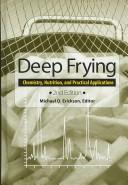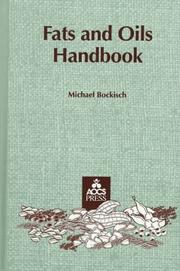| Listing 1 - 10 of 17 | << page >> |
Sort by
|
Book
ISBN: 1630670316 0983057206 1680157051 1630670227 0988856506 9781630670221 9781680157055 9780988856509 Year: 2014 Publisher: Urbana, Illinois : AOCS Press,
Abstract | Keywords | Export | Availability | Bookmark
 Loading...
Loading...Choose an application
- Reference Manager
- EndNote
- RefWorks (Direct export to RefWorks)
This book discusses the current research on monochloropropanediol (MCPD) and glycidyl esters in edible oils. These potentially harmful contaminants are formed during the industrial processing of food oils during deodorization. The mechanisms of formation for these contaminants, as well as research identifying possible precursor molecules are reviewed. Strategies which have been used successfully to decrease the concentrations of these contaminants in edible oils are discussed, including the removal of precursor molecules before processing, modifications of deodorization protocol, and approache
Book
ISBN: 0128140429 0128140410 9780128140420 9780128140413 Year: 2018 Publisher: Urbana, Illinois : AOCS Press,
Abstract | Keywords | Export | Availability | Bookmark
 Loading...
Loading...Choose an application
- Reference Manager
- EndNote
- RefWorks (Direct export to RefWorks)
Oils and fats, Edible --- Analysis. --- Edible oils and fats --- Shortenings --- Oils and fats --- Low-fat diet
Book
ISBN: 1893997979 1680159755 0128043512 9780128043516 9781680159752 9781893997974 9781893997974 Year: 2009 Publisher: Urbana, Illinois
Abstract | Keywords | Export | Availability | Bookmark
 Loading...
Loading...Choose an application
- Reference Manager
- EndNote
- RefWorks (Direct export to RefWorks)
Oils and fats, Edible. --- Edible oils and fats --- Shortenings --- Oils and fats --- Low-fat diet
Book
ISBN: 9780128142714 0128142715 9780128142707 0128142707 Year: 2018 Publisher: [Place of publication not identified]
Abstract | Keywords | Export | Availability | Bookmark
 Loading...
Loading...Choose an application
- Reference Manager
- EndNote
- RefWorks (Direct export to RefWorks)
Oils and fats, Edible --- Health aspects. --- Edible oils and fats --- Shortenings --- Oils and fats --- Low-fat diet
Book
ISBN: 0128200685 0128200677 9780128200674 9780128200681 Year: 2022 Publisher: London, England : Academic Press,
Abstract | Keywords | Export | Availability | Bookmark
 Loading...
Loading...Choose an application
- Reference Manager
- EndNote
- RefWorks (Direct export to RefWorks)
Fully revised and updated, Processing Contaminants in Edible Oils, 2nd edition, presents the latest research on monochloropropanediol (MCPD) and glycidyl esters in edible oils. These potentially harmful contaminants are formed during the industrial processing of food oils during deodorization. A number of advancements in understanding these have been made since the publication of the first edition. These important changes, which impact industrial mitigation, analytical methods, toxicology and regulation, are highlighted for up-to-date reference. The mechanisms of formation for MCPD and glycidyl ester contaminants, as well as research identifying possible precursor molecules are reviewed, as are strategies which have been used successfully to decrease the concentrations of these contaminants. From the removal of precursor molecules before processing, modifications of deodorization protocol, to approaches for the removal of these contaminants after the completion of processing, methods of mitigating and eliminating contaminants are presented.
Oils and fats, Edible --- Deterioration. --- Deterioration of edible oils and fats --- Food contamination. --- Food Contamination --- Propylene Glycols --- Propanols

ISBN: 1893997928 0128043539 161344253X 1630670197 9781613442531 9780128043530 9781630670191 9781893997929 Year: 2007 Publisher: Urbana, Ill. AOCS Press
Abstract | Keywords | Export | Availability | Bookmark
 Loading...
Loading...Choose an application
- Reference Manager
- EndNote
- RefWorks (Direct export to RefWorks)
Deep Frying
Engineering --- Food Science and Technology --- Oils and fats, Edible. --- Deep frying. --- Deep fat frying --- Frying --- Edible oils and fats --- Shortenings --- Oils and fats --- Low-fat diet
Book
ISBN: 0988856581 1613449992 9780988856585 9780983079132 0983079137 Year: 2012 Publisher: Urbana, IL : AOCS Press,
Abstract | Keywords | Export | Availability | Bookmark
 Loading...
Loading...Choose an application
- Reference Manager
- EndNote
- RefWorks (Direct export to RefWorks)
Oils and fats, Edible --- Edible oils and fats --- Shortenings --- Oils and fats --- Low-fat diet --- Analysis. --- chemical structure --- Cooking fats --- Lipids --- fats --- Triglycerides --- chemicophysical properties --- Crystallization

ISBN: 0981893600 0128043555 9781601197184 1601197187 9780128043554 0935315829 9780935315820 9780981893600 Year: 1998 Publisher: Champaign, Ill. AOCS Press
Abstract | Keywords | Export | Availability | Bookmark
 Loading...
Loading...Choose an application
- Reference Manager
- EndNote
- RefWorks (Direct export to RefWorks)
Fats and Oils Handbook (Nahrungsfette und Öle)
Oils and fats, Edible --- Edible oils and fats --- Shortenings --- Oils and fats --- Low-fat diet --- Health aspects. --- Agrotechnology and Food Sciences. Food Sciences --- Handbooks, manuals, etc. --- Food Chemistry --- Chemistry of Food Components.
Book
ISBN: 0988856514 1628702230 0988856565 0983079161 9780988856561 9781628702231 9780983079163 9780988856516 Year: 2013 Publisher: Urbana, Illinois : AOCS Press,
Abstract | Keywords | Export | Availability | Bookmark
 Loading...
Loading...Choose an application
- Reference Manager
- EndNote
- RefWorks (Direct export to RefWorks)
Lipid oxidation in food systems is one of the most important factors which affect food quality, nutrition, safety, color and consumers' acceptance. The control of lipid oxidation remains an ongoing challenge as most foods constitute very complex matrices. Lipids are mostly incorporated as emulsions, and chemical reactions occur at various interfaces throughout the food matrix. Recently, incorporation of healthy lipids into food systems to deliver the desired nutrients is becoming more popular in the food industry. Many food ingredients contain a vast array of components, many of them unknown o
Food -- Quality. --- Lipids -- Oxidation. --- Oils and fats, Edible -- Deterioration. --- Oils and fats, Edible --- Lipids --- Food --- Health & Biological Sciences --- Diet & Clinical Nutrition --- Deterioration --- Oxidation --- Quality --- Deterioration. --- Oxidation. --- Quality. --- Food quality --- Quality of food --- Quality of products --- Lipides --- Lipins --- Lipoids --- Biomolecules --- Steroids --- Deterioration of edible oils and fats
Book
ISBN: 1461433509 1461433517 1283697076 Year: 2012 Publisher: New York : Springer,
Abstract | Keywords | Export | Availability | Bookmark
 Loading...
Loading...Choose an application
- Reference Manager
- EndNote
- RefWorks (Direct export to RefWorks)
Patent literature has always been a mine of information, but until recently, it was difficult to access. Now, with the Internet, access to all patent documents is almost instantaneous and free. However, interpreting the technical information provided by patent literature requires a certain skill. This monograph aims to provide that skill by explaining patent jargon and providing background information on patenting. Patents dealing with edible oil processing are used to explain various aspects of patenting. To make the explanations less impersonal, some have been larded with personal remarks and experiences. Accordingly, this monograph is intended for scientists and engineers dealing with edible oils and fats who want to extend their sources of technical information. Hopefully, it will inspire them to innovate, help them to avoid duplication, and provide them with some amusement. About the Author Albert Dijkstra studied chemistry at Leiden University, specializing in gas kinetics. He never received any specific training in the three subjects treated in this monograph: lipid chemistry, chemical technology, and patents. That may be the reason why he continues to query what he does not understand in these subjects, question established truths, and expose myths. As a result, he has developed several novel processes in the field of directed interesterification, degumming, dry fractionation, and the regeneration of spent bleaching earth. He has also derived an equation for the stripping medium usage in continuous counter-current vacuum stripping, suggested an improved mechanism for the chemical interesterification reaction, contributed to the understanding of the hydrogenation process by highlighting the role of the hydrogen concentration, and introduced the determination of trace metals by ICP in the field of edible oil analysis. This has led to wide recognition: AOCS Chang Award (1997), EuroFedLipid Technology Award (2002), AOCS Bailey Award (2009), AFECG Chevreul Medal (2009), AOCS Mounts Award (2010). He is also a Fellow of the AOCS and Associate Editor of its journal and its Lipid Library website. Although retired, he is active as a scientific consultant, author, editor, inventor, and lecturer.
Chemistry. --- Food science. --- Oils and fats, Edible. --- Health & Biological Sciences --- Biomedical Engineering --- Food industry and trade --- Food preparation industry --- Food processing industry --- Food trade --- Edible oils and fats --- Shortenings --- Food --- Food Science. --- Chemistry/Food Science, general. --- Biotechnology. --- Food processing --- Food technology --- Agricultural processing industries --- Processed foods --- Oils and fats --- Low-fat diet --- Processing
| Listing 1 - 10 of 17 | << page >> |
Sort by
|

 Search
Search Feedback
Feedback About UniCat
About UniCat  Help
Help News
News